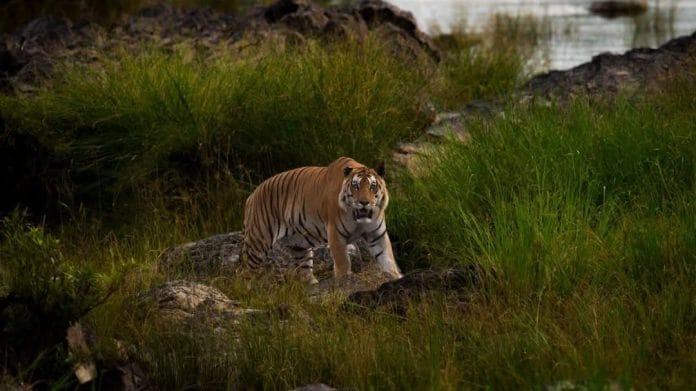New Delhi: India on Monday announced its intention to host the Global Big Cat Summit in 2026, positioning wildlife conservation as a critical component of climate action at the ongoing COP30 climate conference in Belem, Brazil.
Union Environment Minister Bhupendra Yadav made the announcement during the high-level ministerial segment of the International Big Cat Alliance (IBCA), reiterating India’s leadership role in big cat protection and drawing direct connections between species conservation and climate resilience.
“Where big cats thrive, forests are healthier, grasslands regenerate, water systems function, and carbon is stored efficiently in living landscapes,” Yadav said.
The announcement came shortly after Yadav participated in the opening of the high-level segment of the United Nations Framework Convention on Climate Change (UNFCCC)’s 30th Conference of Parties (COP) and delivered India’s national statement alongside other world leaders.
Created by the Indian government in 2023 to mark 50 years of Project Tiger, the International Big Cat Alliance currently comprises 15 member countries and 2 observer nations committed to protecting the seven big cat species and their habitats across the globe. The member countries include Cambodia, Bhutan, Bangladesh, Ethiopia, and most recently, Nepal.
India, which hosts five of the seven big cat species—tiger, lion, leopard, cheetah, and snow leopard—said it has one of the world’s most comprehensive wildlife databases built through conservation efforts. Yadav emphasised that this conservation work represents a natural form of climate action that deserves greater recognition in global climate frameworks.
“What we often call ‘wildlife conservation’ is, in fact, climate action in its most natural form,” he said at the event.
While India is yet to announce its updated nationally determined contributions (NDCs) at COP30, the IBCA high-level segment featured Yadav advocating for the inclusion of nature-based climate action, such as protecting Big Cat landscapes, as part of future NDCs by countries worldwide.
NDCs constitute a list of climate actions released by countries every five years.
Also Read: India’s NDCs by Dec, Bhupender Yadav tells developed nations at COP30 to speed up net-zero targets
Inspector General of the National Tiger Conservation Authority Amit Mallick Tuesday spoke about the need to highlight wildlife conservation at the global climate conference.
“At COP30, governments should place wildlife protection at the heart of climate action, recognising that apex predator species such as tigers and snow leopards embody the integrity of the ecosystems that absorb carbon, regulate water, and withstand climatic shocks,” he said in a statement.
Strengthening south-south cooperation
The IBCA, which held its inaugural assembly in 2025 in New Delhi, where Bhupendra Yadav was chosen to lead the alliance, represents a significant platform for south-south cooperation.
Apart from 15 members and 2 observers, there are a total of 95 countries that have big cat ranges within their territories. Several countries, including Egypt, Saudi Arabia, Peru and Ecuador, have consented to IBCA membership but are yet to sign the formal agreement.
The alliance’s main objective is to support collaboration between big cat countries, including the sharing of resources, knowledge and conservation strategies. It has already facilitated bilateral meetings and memoranda of understanding, such as the 2022 agreement between India and Cambodia to translocate Indian tigers to Cambodia.
At COP30, Yadav stressed how big cat protection also highlights south-south cooperation, given that a majority of the countries with big cat habitats are in the Global South. He urged other range countries to join IBCA, focusing on the conservation of wildlife, ecological habitats, local communities’ livelihoods, and the building of ecosystems.
“We must collaborate, not compete. We must find strength not in isolation, but in solidarity,” Yadav said, adding: “Protecting big cats is protecting our shared planet. Protecting big cats is protecting our future.”
Also Read: Oil’s not well: 1,600 fossil fuel lobbyists attending COP30 in Brazil, says climate advocacy group






